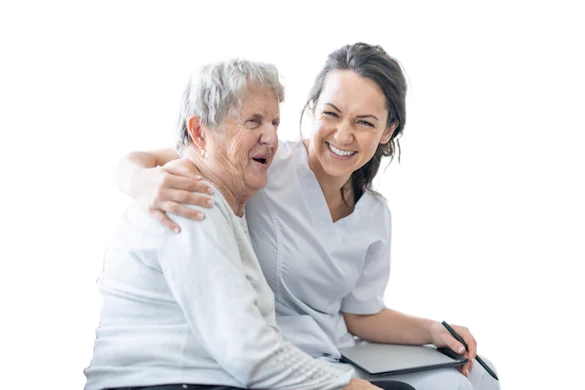
What is Medicare-Certified Home Health?
Medicare-Certified Home Health can be a more affordable and convenient option than a skilled nursing facility. Learn more about these types of providers here.

Key Takeaways



What is Medicare-Certified Home Care?
Medicare-certified home care provides a variety of health and personal care services in the comfort of your own home. These providers are typically used after a hospital stay in lieu of moving into a skilled nursing/long-term care community. Services are provided by a skilled nurse or qualified home health aid and may include medication administration, respiratory monitoring, post-surgical care or post-stroke care. For a person to qualify for services from a Medicare-certified home health care, they must meet certain criteria.
When is Home Care Right for You?
To qualify for Medicare-certified home care, a hospital stay is required, along with a referral from a physician or medical professional. If you or a loved one could benefit from these things, it might be time to consult with your medical professional about home care:
- Need help with daily tasks like bathing, dressing, or getting around the house.
- Require skilled nursing care, such as wound care or medication management.
- Are recovering from a surgery or illness and need some extra support.
- Want to maintain your independence but need some assistance.
How Much Does Home Care Cost?
The cost of Medicare-certified home care can vary depending on the services you need and the length of time you require them. The national average cost for Medicare-certified home care is $6,292 per month (based on 44 hours per week). To ensure you get an accurate estimate of home care in your area, be sure to contact them directly and ask about hourly rates, schedule of care, and any additional fees that may not be included in the hourly rate.
What Services Does Home Care Offer?
Medicare-certified home care agencies offer a wide range of services:
- Skilled nursing care: such as wound care, medication management, and injections
- Personal care assistance: such as bathing, dressing, toileting, housekeeping and meal preparation
- Therapy services: such as physical therapy, occupational therapy, and speech therapy
- Hospice & Palliative Care: includes pain management, emotional and spiritual support as well of end-of-life planning
- Care Management: includes reviewing hospital discharge information, medication reconciliation, and support in arranging and attending follow-up doctor visits
Two Types of Home Care
As you begin exploring home care, you may come across two different kinds: Medicare-certified & non-medical. It's important to understand the difference to ensure you choose the provider that's right for you. Below is a quick look at the different types of services each can provide.
- Medicare-Certified Home Care: is provided by a medical professional (skilled nurse or qualified home health aid). These providers offer services like medication administration, therapy services, hospice care and wound care. These types of providers must be licensed and receive patient ratings through the Centers for Medicare and Medicaid (CMS). You can see these ratings on our listings as well as on Medicare.gov.
- Non-Medical Home Care: does not need to be provided by a medical professional. These providers offer services like cooking, cleaning, companionship and help with grooming, changing or bathing. Learn more about non-medical home care.
Choosing a Provider
Finding the right Medicare-certified home care provider can be a tough decision. When considering providers, here are a few things to consider. Interview several agencies and choose one that listens to your needs and preferences and provides caregivers you feel comfortable with. Ask for references from past clients or their families to hear about their experiences. Consider getting recommendations from friends, family, or your doctor. Use Medicare.gov or SeniorCareFinder.com to review patient ratings and surveys.
Conclusion
Medicare-certified home health care is a trusted and cost-effective option for seniors who need medical support while maintaining the comfort and independence of home. With services like skilled nursing, therapy, and post-hospitalization care, these providers offer a level of care comparable to hospitals or skilled nursing facilities, without requiring a move. If you or a loved one is recovering from surgery, managing a chronic condition, or needs help with daily tasks, exploring Medicare-certified home health providers may be the right next step. At Senior Care Finder, you can easily search and compare over 11,000 Medicare-certified home care agencies based on patient ratings, services offered, and location. Start your journey to high-quality care at home with confidence—visit our Medicare-Certified Home Health Directory today.
Find Medicare-Certified Home Care
Are you in need of Medicare-certified home care? Start your search here. Senior Care Finder is the only online resource that allows you to search, compare, and find best option for you or a loved one. Use the button below to find options in your area, view patient ratings, and connect with a provider that's right for you.